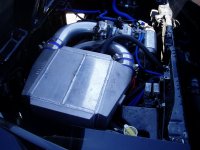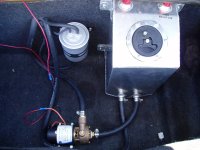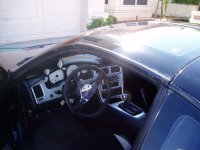I vastly prefer Air to Liquid Intercoolers over FMIC and hugely dislike TMIC. I both appreciate RAM providing an air-to-liquid system and think it's a giant step in the right direction.
My only concerns are related to lack of knowledge on how to drive, maintain and care for turbo vehicles (especially liquid-to-air cooled), and how or if they will implement guardrails and notifications through the infotainment or dash to prevent the many issues that can cause damage and catastrophic failure. Maybe the knowledge is more widespread than I'd think.
I'd compare going from naturally aspirated to turbos like going from paper airplanes to rockets. Superchargers to Air2Liquid Intercooler turbos like 747's to SpaceX Dragon in terms of complexity, meticulous maintenance, and knowledge of how the vehicles reacts to determine potential issues (before a code has even been thrown).
Having only owned and built forced induction sports cars, the issues that pop in my mind are:
-presumably some of us will drive our trucks in mud or (dirty water), and that mud is going to get in IC radiator, and I don't see how computer is going to catch that and warn us to clean it out asap. The heat loads of Turbos vs Superchargers are vastly different, and a little mud shouldn't vastly impact supercharger performance and reliability as their cooling demands aren't nearly as significant but I'm sure someone has found a way to create an issue there.
-Is RAM going to ship our trucks with an included oil catch can and if so, how accessible as oil contamination and turbos are like bedfellows.
-Air2Water boost leaks, especially at 26 PSI can be significant and finding and being able to band aid can be difference between a tow or stranded on a trail.
-Heat soak - I'd imagine there will be temp sensors to warn of core heat soak, but knowing how to dissipate and more importantly how not to is critical.
-Will we have integrated turbo timers or is RAM banking on the fact that we all know after periods of heavy load (driving fast, hauling stuff, having fun) that we shouldn't immediately turn off the engine because the flow of oil to turbos also stops which then causes the oil remaining in the turbines to burn and carbonize within and forms deposits that no are left to damage the turbines. I'm sure there are fancy solutions to this problem, but turbo timers are effective and the simplest decision.
@Dcchris311 I hear ya with the ice cubes. My buddy designed a core with Spearco, and we group funded it back in 2000, and we did the ice thing, but we had to learn the hard way that coolant composition mattered immensely, and ice introduced minerals that caused scaling and corrosion damage. Even tried the wrapping reservoir with dry ice because we were full of awesome ideas. Fun fact, dry ice surrounding a stainless-steel reservoir will freeze it solid faster than it takes to get to starting line and take off

We also didn't realize that every time we opened the reservoir, we introduced air into the system that needed bled, and on and on.
I recall when we used to black box everything with AVCR's, SAFC's, VAFC's, and turbo timers and then evolved to programable EMS. Now we have the onboard ECU parade that has it all plotted out and removes the guesswork and testing. I am very much excited to see how RAM tames 26 PSI dependably and see what guardrails they've installed to combat/eliminate owner ignorance.











